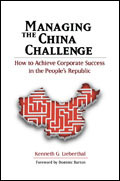
 The speed and scope of China’s economic growth are transforming the global landscape of power and resource distribution. China’s booming economy presents opportunities for multinational corporations (MNCs) with a good understanding of the rules of China’s business world to reap large benefits. In his new book Managing the China Challenge: How to Achieve Corporate Success in the People’s Republic, eminent China scholar Kenneth G. Lieberthal draws on his deep understanding of China’s economic and political systems to explain the strategies that MNCs should employ to succeed in doing business in China.
The speed and scope of China’s economic growth are transforming the global landscape of power and resource distribution. China’s booming economy presents opportunities for multinational corporations (MNCs) with a good understanding of the rules of China’s business world to reap large benefits. In his new book Managing the China Challenge: How to Achieve Corporate Success in the People’s Republic, eminent China scholar Kenneth G. Lieberthal draws on his deep understanding of China’s economic and political systems to explain the strategies that MNCs should employ to succeed in doing business in China.
He starts by analyzing the core features of China’s political economy. The Chinese state has become a bureaucratic capitalist machine; in other words, the political system operates in such a way that rapid economic growth is an organic outcome. In comparison to the three-level political system in the U.S., China has a five-level system: national, provincial, municipal, county, and township. The top-down appointment system ensures that political leaders should stay sensitive to the goals and concerns – many of them economic – of the leaders at the level directly above them. In turn, the leaders at each level permit their lower level appointees some autonomy to decide which initiatives to take to make the regional economy grow. Good performances would translate into a good evaluation that puts them in line for promotion. Therefore, the top-down appointment scheme ensures that the state’s concern to promote economic development is fully addressed by officials at all levels of the political hierarchy in China.
Local officials are keen about competing for public, private, and foreign investment by building new infrastructure, providing tax holidays, and offering other special incentives to improve the local economic development record. Conversely, for business entrepreneurs in China, the state is always at least your silent partner:
“There are numerous ways in which the local party-state supports enterprises in its jurisdiction, such as granting business licenses and changes in those licenses, making available land and credit at below-market rates, providing some protection against competitors from outside the locality, effectively exempting certain local firms from regulatory obligations” (21).
The intertwining of business and politics in China creates a “high-risk business environment” because Chinese political leadership is implementing five transformations – urbanization, privatization, marketization, globalization, and the information revolution – so audacious that their speed and scale alone generate sustained high levels of social tension (80). In light of this, MNCs need to pay close attention to politics at the local, national, and international levels.
Lieberthal then provides advice on identifying the right people to ask the right questions in the right language to seize, consolidate, and make good use of corporate opportunities. Due to the intricacies of leadership and professional relations, the consensus building process can be protracted. Therefore, it is important for MNCs to identify the major players that must reach consensus for their initiatives to move forward and what these players’ positions are. With an understanding of local and national priorities, articulating one’s business agenda in the terms of the vocabulary and goals of top local and national political leaders can smooth the way to approvals.
MNCs, in the words of Lieberthal, are “solutions business,” meaning that they have tremendous business opportunities and are able to provide solutions to handle risks in China. Lieberthal suggests that MNCs should promote five necessary strategic changes. It is important to:
- Give the in[side]-China operation significant autonomy and the resources necessary to develop new ways of doing things and new products.
- Allow the in-China unit to make decisions quickly in an environment where opportunities and risks are rapidly evolving.
- Staff the in-China effort with people who have the qualities required to run global businesses, not simply to execute strategic plans made at higher tiers.
- Shift high-value activities to China. In addition, the China team must understand that the state is explicitly or implicitly always its partner and is able to affect the outcome of its business plan.
“In addition, the in-China team must understand that the Chinese government is either explicitly or implicitly always their partner and able to affect the success of the business plan” (78-9).
Managing the China Challenge provides a straightforward handbook to businesses who aspire to succeed in China. Thanks to his academic background in the Chinese political economy, Lieberthal clearly spells out the unwritten rules of how the Chinese party-state guides the economy, indispensable knowledge for business entrepreneurs. The Chinese political economy explains much about China’s success, as well as many of its deep-seated problems. The current Chinese economic model is unsustainable and may hinder growth if it stays unchanged; however, it will nonetheless still be crucial for MNCs to remain sensitive to the state’s political and economic concerns. The book does not offer comprehensive or concrete answers to corporate strategies, but is a great source to help frame the questions for business entrepreneurs seeking success in the Middle Kingdom.
Shiran Shen is a senior honors political science student at Swarthmore College in Pennsylvania, USA.